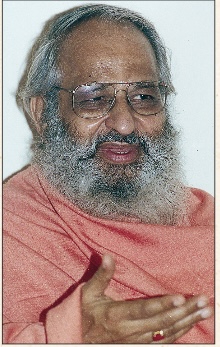By Swami Veda Bharati
Any individual experience is a ripple in the stream of karma; any event is a wave in the sea of history. No event, nor its causes and consequences, can be studied in isolation from what has transpired in a thousand years and what is to come as a chain of consequences in the next thousand years. The Godhra event has to be seen in the perspective of history. For this, first the Hindus need to follow the tradition of self-examination: kim aham paapam akaravam, “What transgressions did I commit; where did I fail?” Only through such self-examination can we purify ourselves and become spiritually strong. Second, the Muslims need to similarly do the same degree of self-examination.
The Hindu self-examination has to extend to long-term history, as well as short-term events. In the long term, is it not true that, in spite of our present demand, the Muslims should identify with the history of India, [but that] whenever they have attempted to do so, they have not been accepted within Hindu society? Malik Mohammad Jayasi can create a “Hindu” epic, Padmavat, based on the mystical kundalini experience in the 14th century, and so many of our contemporary Muslim communities, such as the Mevs, continue with the dance dramas based on Mahabharata. Yet they will always remain mlecchas [outsiders] in Hindu eyes. How many Hindus recognize that had it not been for the translations by Dara Shikoh [the tolerant son of Mogul emperor Shah Jahan], the Upanishads may never have reached the West. Since the Muslim experience tells them that no matter what they do to identify with the history and traditions of India, without infringing on the tenets of their religion they are not likely to be accepted, then they might as well continue to identify with the Muslim ummah, their own trans-national universal community.
In the short term, is it true, as is alleged, that the devotees of Rama passing through Godhra on the way back from devotional service at Ayodhya taunted and threatened fellow Muslim passengers for days and weeks before the horrible attack took place? We Hindus must look into this.
Muslim self-examination also needs to be both short term and long term. In the long term, while they extol the greatness of Akbar, how many actually condemn the narrowminded cruelties, for example, the zaziya tax on non-Muslims, of the Aurangzebs [a brutal Moghul emperor who obtained his throne by murdering his older brother, Dara Shikoh] among them? How many dare side with Dara Shikoh in his tolerance? How many are actually willing to say that the massacres of Hindus and the desecrations of their temples on a vast scale, the destruction of the universities including at Nalanda, and similar other cultural catastrophes visited upon India over a period of a thousand years did actually happen, and that these were barbarous acts committed by those who brought Islam into the country by force? Leave alone India, how many Muslim leaders in the world community today are willing to say that the destruction of Zoroastrian traditions by the burning of their literature and destruction of their temples in Iran should not be regarded as a glorious act on the part of the Muslim conquerors of that land?
In the short term, the more enlightened among the Muslims do need to come out openly and state that many of their coreligionists do lack in their loyalty to India. This writer runs a school for ex-leper children and other indigents in a poor area. The children of all religions are given help and guidance without distinction. One day a teacher, while quizzing the class, asked, “What is the name of our country?” Three Muslim children replied “Pakistan.” Until such attitudes are purged from the Muslim psyche, the Hindus, who have felt aggrieved and cruelly persecuted for a thousand years, will find it difficult to abandon their irrational generalization of all Muslims as being enemies of Hindus or traitors to India.
Perhaps the more enlightened, the pious and the scholarly among both communities need to sit down together, outside the influence of politicians, and help each other conduct a self-examination. Let the Hindus openly admit that their narrowmindedness and the hatred of the so-called mlecchas and the unclean people is to be rejected as much as the other party’s hatred of the kaffir [non-Muslim, infidel].
If the Pope in the Vatican can apologize for the persecution unjustly visited upon the Jews, why is it that leading figures among the Muslims cannot say that the destruction of Hindu temples by invaders from other countries was entirely wrong and, alongside that candid admission, offer a collective apology for the deep historical hurt. Perhaps then the Hindus will also respond by saying, “Alright, then, let it be; we shall not insist on building the temple at exactly the same spot where a disputed structure stood.” Perhaps the Muslims will join in the kar seva, selfless service, and help build a temple nearby. There are many examples of such mutual cooperation in the past, and in the present as well, and that is what can give us hope.
What is needed is pulling out of rigid mindsets and exploring some new courageous ways. Otherwise both communities are doomed to another thousand years of strife, holding back the progress of India. The direction of the waves of history can be changed with some practical application of some ancient wisdom imparted and shared by the wise among the two communities.
Swami Veda Bharati is a direct disciple of the late Swami Rama and is the current Spiritual Director and Preceptor of Sadhana Mandir in Rishikesh. He has been teaching for 53 years and officially received sannyas initiation in 1992.
